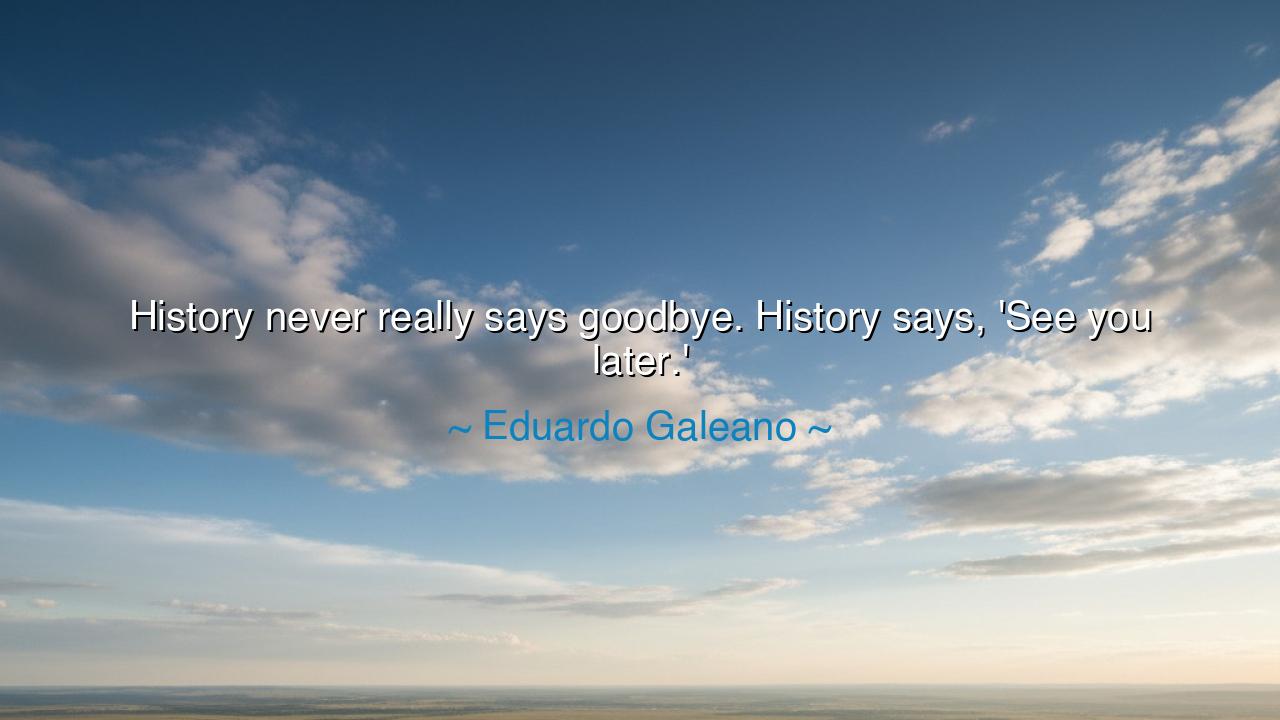
History never really says goodbye. History says, 'See you later.'






The Uruguayan writer and visionary Eduardo Galeano, whose pen breathed life into the forgotten voices of the oppressed and the silenced, once wrote: “History never really says goodbye. History says, ‘See you later.’” In this brief but profound reflection, Galeano unveils one of the deepest truths of human existence — that history is not a relic buried in the past, but a living presence that returns, again and again, to remind us of what we have not yet learned. It does not fade; it waits. It does not vanish; it transforms. Every injustice unresolved, every dream unfinished, every truth ignored — all return to us, demanding to be faced once more. For as long as humanity forgets, history remembers.
The origin of this quote lies in Galeano’s lifelong devotion to exploring the soul of Latin America — its struggles, its wounds, and its unbreakable spirit. Through his works such as Open Veins of Latin America and The Book of Embraces, he revealed how the past, far from being dead, continues to shape the fate of the present. For Galeano, history was not written merely in books, but in the blood, the land, and the memory of peoples who refused to disappear. When he said that “history never really says goodbye,” he spoke not only of empires and revolutions, but of the enduring presence of the human story — a story that persists, whether told or denied, whether celebrated or suppressed.
To say that “history says, ‘See you later’” is to recognize that the past is cyclical — that its lessons, when unlearned, will return with renewed force. Tyrannies fall, yet the seeds of tyranny linger in the soil; wars end, yet the hunger for power and pride rekindles the flame. This is the tragic rhythm of civilization: we bury the past, only to meet it again at another crossroads. But Galeano’s tone was not one of despair; it was one of warning and hope. He believed that by remembering — truly remembering — we could finally greet history not as an enemy returning, but as a teacher we have at last learned to understand.
Consider the story of South Africa, a land scarred by centuries of racial division. When apartheid ended, it was said that a new era had dawned, that history had finally said farewell. Yet the wounds of inequality and injustice did not vanish overnight. They lingered — in poverty, in prejudice, in pain unspoken. And so, history returned, whispering: “See you later.” Only through truth and reconciliation, through the act of confronting the past with honesty and compassion, could the nation begin to heal. This is what Galeano meant — that the past will always return until it is resolved. History’s echoes are not curses, but calls to finish the work left undone.
The same can be seen on a global scale. The cries of colonialism, the rise and fall of dictatorships, the wars waged in the name of progress — these stories are not over. Their echoes live on in economic inequality, in displacement, in the yearning of people to reclaim their dignity. Every generation believes itself free from the past, yet it walks upon the same ground, sowing the same seeds. Galeano’s wisdom reminds us that progress is not achieved by forgetting, but by remembering with purpose. To deny history is to invite its return in harsher form. To embrace it with courage is to transform it.
And yet, there is also beauty in what Galeano says. For if history never truly says goodbye, then the noble deeds, too, never die. The courage of those who resisted oppression, the love of those who built hope from ruin, the songs of freedom sung by generations — these also return. History’s “See you later” is not only a warning; it is a promise. The light of justice and compassion, though dimmed at times, can never be extinguished. The dreams of our ancestors live on in us, waiting to be fulfilled.
Let this, then, be the lesson of Galeano’s words: do not turn your back on history, for it walks beside you. Learn its language; listen to its voice. When it returns — as it always does — meet it not with denial, but with understanding. Seek to remember wisely, for remembrance is the first act of liberation. Teach your children not only the victories, but the failures, so that they may not stumble where others fell. Live with awareness that every action, every silence, every injustice ignored, becomes the history that will one day return to greet your descendants.
For as Eduardo Galeano taught, history never really says goodbye — it only steps aside, watching to see whether we have learned enough to meet it again with wisdom instead of sorrow. Let us live, then, as students of the past and stewards of the future, ensuring that when history says “See you later,” it will return not as a ghost of regret, but as a companion in our continued march toward justice and truth.






AAdministratorAdministrator
Welcome, honored guests. Please leave a comment, we will respond soon